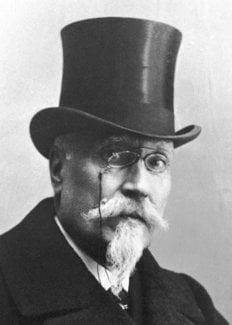José Echegaray
Biographical

José de Echegaray (1833-1916), son of a professor of Greek, was born in Madrid. He went to an engineering school, studied economics, and had a distinguished career in the Spanish Government. He was successively Minister of Public Works and Finance Minister. At the height of his career he turned to the stage, a passion that dated back to his youth. A mathematician, engineer, and administrator, he built his plays with the same regard for exactitude and duty that inspired his public life. Conflicts involving duty are at the heart of most of his plays, and he upheld the idea with uncompromising severity. His exalted romanticism appears in his choice of subjects. Like his great predecessors of the Spanish Golden Age, Echegaray was a prolific playwright. His most famous plays were: La esposa del vengador (1874) [The Avenger’s Wife]; En el puño de la espada (1875) [The Sword’s Handle]; En el pilar y en la cruz (1878) [The Stake and the Cross], a play defending the freedom of thought, which aroused much controversy; Conflicto entre dos deberes (1882) [Conflict of Duties], the title of which is programmatic for Echegaray’s entire work; O locura ó santidad (1877) [Madman or Saint]; and El gran Galeoto (1881) [Great Galeoto ].
This autobiography/biography was written at the time of the award and first published in the book series Les Prix Nobel. It was later edited and republished in Nobel Lectures. To cite this document, always state the source as shown above.
José Echegaray died on September 4, 1916.
The Nobel Foundation's copyright has expired.Nobel Prizes and laureates
Six prizes were awarded for achievements that have conferred the greatest benefit to humankind. The 14 laureates' work and discoveries range from quantum tunnelling to promoting democratic rights.
See them all presented here.
